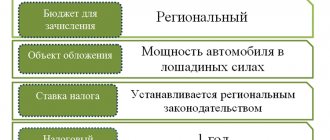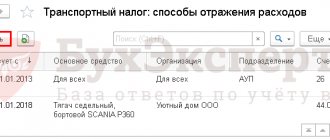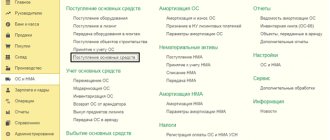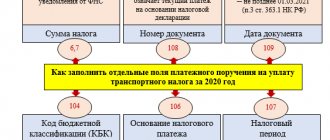Tax Code of the Russian Federation. Chapter 28
1. Taxpayers who are organizations shall calculate the amount of tax and the amount of advance tax payment independently. The amount of tax payable by taxpayers who are individuals is calculated by the tax authorities on the basis of information submitted to the tax authorities by the authorities carrying out state registration of vehicles on the territory of the Russian Federation.
2. The amount of tax payable to the budget at the end of the tax period is calculated for each vehicle as the product of the corresponding tax base and tax rate, unless otherwise provided by this article.
The amount of tax payable to the budget by taxpayers who are organizations is determined as the difference between the calculated amount of tax and the amounts of advance tax payments payable during the tax period.
2.1. Taxpayers who are organizations calculate the amount of advance tax payments at the end of each reporting period in the amount of one-fourth of the product of the corresponding tax base and the tax rate.
3. In the case of registration of a vehicle and (or) deregistration of a vehicle (deregistration, exclusion from the state ship register, etc.) during the tax (reporting) period, the amount of tax (the amount of advance payment for tax) is calculated taking into account the coefficient defined as the ratio of the number of full months during which the vehicle was registered to the taxpayer to the number of calendar months in the tax (reporting) period. In this case, the month of registration of the vehicle, as well as the month of deregistration of the vehicle, is taken as a full month. In case of registration and deregistration of a vehicle within one calendar month, the specified month is taken as one full month.
4. Bodies carrying out state registration of vehicles are required to report to the tax authorities at their location about vehicles registered or deregistered with these authorities, as well as about the persons to whom the vehicles are registered, within 10 days after their registration or deregistration.
5. Bodies carrying out state registration of vehicles are required to report to the tax authorities at their location information about vehicles, as well as about the persons on whom the vehicles are registered, as of December 31 of the expired calendar year until February 1 of the current calendar year, as well as all related changes that occurred during the previous calendar year.
The information specified in paragraphs 4 and 5 of this article is submitted by the bodies carrying out state registration of vehicles in forms approved by the federal executive body authorized for control and supervision in the field of taxes and fees.
6. The legislative (representative) body of a constituent entity of the Russian Federation, when establishing a tax, has the right to provide for certain categories of taxpayers the right not to calculate or pay advance tax payments during the tax period.
Transport tax
The procedure for calculating and paying transport tax is regulated by Chapter 28 of the Tax Code of the Russian Federation and the Law of the Krasnoyarsk Territory of November 8, 2007 No. 3-676 “On Transport Tax”.
Objects of taxation
Vehicles that are subject to taxation are listed in paragraph 1 of Art. 358 Tax Code of the Russian Federation. These include:
cars, motorcycles, scooters, buses;
other self-propelled machines and mechanisms on pneumatic and caterpillar tracks;
airplanes, helicopters, other air vehicles;
motor ships, yachts, sailing vessels, boats, motor boats, jet skis, non-self-propelled (towed) vessels, other water vehicles;
snowmobiles, motor sleighs.
Vehicles that are not subject to taxation are listed in paragraph 2 of Art. 358 Tax Code of the Russian Federation.
Taxpayers
Taxpayers of transport tax are individuals and legal entities on which vehicles that are subject to taxation are registered.
If vehicles registered to individuals were purchased and transferred under a power of attorney before July 30, 2002, then the taxpayer is the person indicated in this power of attorney. Persons to whom such vehicles are registered must notify the tax office at their place of residence. Information that should be included in the notification is listed in paragraph 7 of the Methodological Recommendations approved by Order of the Ministry of Taxes and Taxes of the Russian Federation dated 04/09/2003 No. BG-3-21/177.
Article 4 of the Law of the Krasnoyarsk Territory “On Transport Tax” provides tax benefits for certain categories of taxpayers, as well as the procedure for applying these benefits.
Tax base by type of vehicle
The tax base by type of vehicle is determined for each vehicle (see Table 1).
Table 1
| Type of vehicle | The tax base |
| Vehicles with engines | Vehicle engine power in horsepower |
| Aircraft for which jet engine thrust is determined | Nameplate static thrust of a jet engine (total nameplate thrust of all jet engines) of an air vehicle during takeoff in terrestrial conditions in kilograms of force |
| Non-self-propelled (towed) water vehicles for which gross tonnage is determined | Gross tonnage in registered tons |
| Other water and air vehicles | Vehicle unit |
Transport tax rates
Transport tax rates are established by the laws of the constituent entities of the Russian Federation. Tax rates for the Krasnoyarsk Territory are shown in Table 2.
table 2
| Name of taxable object | Tax rate (in rubles) |
| Passenger cars with engine power (per horsepower): | |
| up to 100 hp (up to 73.55 kW) inclusive | 6 |
| over 100 hp up to 150 hp (over 73.55 kW to 110.33 kW) inclusive | 18 |
| over 150 hp up to 200 hp (over 110.33 kW to 147.1 kW) inclusive | 36 |
| over 200 hp up to 250 hp (over 147.1 kW to 183.9 kW) inclusive | 63,5 |
| over 250 hp (over 183.9 kW) | 127 |
| Motorcycles and scooters with engine power (per horsepower): | |
| up to 20 hp (up to 14.7 kW) inclusive | 2 |
| over 20 hp up to 35 hp (over 14.7 kW to 25.74 kW) inclusive | 5 |
| over 35 hp (over 25.74 kW) | 12,5 |
| Buses with engine power (per horsepower): | |
| up to 200 hp (up to 147.1 kW) inclusive | 11,5 |
| over 200 hp (over 147.1 kW) | 23 |
| Trucks with engine power (per horsepower): | |
| up to 100 hp (up to 73.55 kW) inclusive | 6 |
| over 100 hp up to 150 hp (over 73.55 kW to 110.33 kW) inclusive | 9 |
| over 150 hp up to 200 hp (over 110.33 kW to 147.1 kW) inclusive | 23 |
| over 200 hp up to 250 hp (over 147.1 kW to 183.9 kW) inclusive | 58 |
| over 250 hp (over 183.9 kW) | 85 |
| Other self-propelled vehicles, pneumatic and tracked machines and mechanisms (per horsepower) | 11,5 |
Tax and reporting periods
The tax period for transport tax is one year.
Reporting periods for organizations are the 1st quarter, 2nd quarter, 3rd quarter.
Procedure for calculating tax and advance payments
Organizations calculate the amount of tax and advance payments independently for each vehicle.
If a vehicle is registered or deregistered during a calendar year, then the tax (advance payment) is calculated taking into account the coefficient (K), which takes into account the actual period of ownership of the vehicle:
K = F/O, where
F – the number of full months during which the vehicle was registered to the taxpayer (the month of registration is taken as a full month, similarly the month of deregistration is taken as a full month),
О – number of months in the reporting (3) or tax period (12).
If the taxpayer owned the vehicle during the entire reporting or tax period, then the value of the coefficient K will be equal to 1 (3/3 and 12/12, respectively).
The amount of the advance payment for the i-th quarter (Ai) is calculated as the fourth part of the product of the tax base (TB) and the tax rate (TS):
Аi = ¼ x NB x NS x K
The tax amount (TN) for the year is determined as the product of the tax base and the tax rate:
TN = NB x NS x K
The amount of tax (TNup) payable to the budget at the end of the year (tax period) is determined minus advances accrued during the year:
TNup = TN – A1kv – A2kv – A3kv
Individuals (individual entrepreneurs) pay tax on the basis of a tax notice received from the tax office. A tax notice cannot be drawn up for more than three previous calendar years.
Deadlines for payment of transport tax
The deadlines for paying taxes and advance payments are established by the laws of the constituent entities of the Russian Federation.
In the Krasnoyarsk Territory, advance payments for transport tax are paid by organizations no later than April 30, June 30 and October 31 of the current year. Individuals, including individual entrepreneurs, do not pay advance payments.
The deadline for paying transport tax is February 10 for legal entities, and November 10 for individuals of the year following the expired tax period.
Tax reporting
Advance payments for transport tax are not provided. The tax return is submitted by organizations to the tax authority at the place of registration of vehicles no later than February 1 of the year following the expired tax period. The largest taxpayers submit a tax return to the tax authority at the place where they are registered as the largest. Since 2012, the tax return for transport tax must be submitted in the form approved by order of the Federal Tax Service of Russia dated February 20, 2012 No. ММВ-7-1/ [email protected]
Individuals, including individual entrepreneurs, pay transport tax on the basis of a tax notice received from the tax authority. The notification form was approved by order of the Federal Tax Service of Russia dated October 5, 2010 No. ММВ-7-1/ [email protected] The tax notification is sent by the tax authority no later than 30 days before the payment is due.
Article 358 of the Tax Code of the Russian Federation. Object of taxation (current version)
The official body explains that, as follows from the specified norm of the Tax Code of the Russian Federation, for the purpose of exemption from transport tax, two independent and not identical categories of vehicles are identified, for each of which its own conditions for exemption from transport tax are established. In accordance with Order of the Ministry of Internal Affairs of Russia dated November 24, 2008 N 1001 “On the procedure for registering vehicles,” the State Traffic Inspectorate authorities are authorized to make the necessary notes in the vehicle passport. Thus, the State Traffic Inspectorate authorities in the section “Special Transport Tax” of Part Two of the Tax Code of the Russian Federation, approved by Order of the Ministry of Taxes of the Russian Federation dated 04/09/2003 N BG-3-21/177, confirm that the main activity of the organization is passenger and (or) freight transportation, are:
1) provisions of the constituent documents (memorandum of association, charter, regulations and other documents) defining passenger and (or) freight transportation as the main type of activity, the purpose of creating the organization;
2) availability of a valid license for cargo transportation and (or) passenger transportation.
Important!
Thus, in order to apply the benefits established by subparagraph 4 of paragraph 2 of Article 358 of the Tax Code of the Russian Federation, the taxpayer must prove the fact of carrying out the transportation of passengers (cargo) as the main activity.
Arbitrage practice.
The Resolution of the Ninth Arbitration Court of Appeal dated 02/07/2017 N 09AP-64073/2016 provides an interpretation of the provisions of subparagraph 4 of paragraph 2 of Article 358 of the Tax Code of the Russian Federation: this benefit is a measure of state support for persons who own expensive, technically complex means of transport - ships (sea, river, air), the acquisition and operation of which is associated with significant costs. It is designed to promote the affordability of these types of transport and the harmonious development of the transport system, including in remote regions that do not have an extensive network of roads and railways. The benefit is provided to persons engaged in passenger or cargo transportation (i.e., ship operators) who do not have other, more profitable sources of income, or the share of other income in their revenue is insignificant.
At the same time, the wording “carrying out passenger and (or) cargo transportation” used by the legislator in subparagraph 4 of paragraph 2 of Article 358 of the Tax Code of the Russian Federation is not equivalent to the transportation of passengers and cargo solely on the basis of transportation contracts, as the tax authority mistakenly believes.
Indeed, Article 784 of the Civil Code of the Russian Federation provides that the transportation of goods, passengers and luggage is carried out on the basis of a contract of carriage. But civil legislation also provides for other forms of activity in the field of passenger and freight transportation.
Subclause 5 of clause 2 of Article 358 of the Tax Code of the Russian Federation does not recognize tractors, self-propelled combines of all brands, special vehicles (milk tankers, livestock trucks, special vehicles for transporting poultry, for transportation and application of mineral fertilizers, veterinary care, maintenance).
In this case, an agricultural producer is understood as an individual or legal entity engaged in the production of agricultural products, which in value terms constitutes more than 50 percent of the total volume of products produced, including a fishing artel (collective farm), production of agricultural products, including fish products, and catches aquatic biological resources in which in value terms constitute more than 70 percent of the total volume of production, as established in Article 1 of the Federal Law of December 8, 1995 N 193-FZ “On Agricultural Cooperation”.
Important!
In order to confirm the status of an agricultural producer, the taxpayer provides the tax authority with a calculation of the cost of the products produced, highlighting the agricultural products produced. When determining the specified share, neither in the volume of agricultural products produced, nor in the total volume of products produced, purchased goods are not taken into account. (Clause 17.3 of the Methodological Recommendations for the application of Chapter 28 “Transport Tax”.)
Official position.
The letter of the Ministry of Finance of Russia dated January 19, 2017 N 03-05-06-04/2135 states that based on subparagraph 5 of paragraph 2 of Article 358 of the Tax Code of the Russian Federation, the main criteria for non-recognition of the above-mentioned vehicles as objects of taxation are the compliance of an individual or legal entity with the concept of an agricultural producer, defined Article 1 of the Federal Law of December 8, 1995 N 193-FZ “On Agricultural Cooperation”, and the use of each vehicle registered to an agricultural producer for its intended purpose during the tax period for transport tax. Consequently, if the above conditions are met, the vehicles listed in subparagraph 5 of paragraph 2 of Article 358 of the Tax Code of the Russian Federation are not recognized as an object of taxation for transport tax.
Current problem.
In practice, people running private farms ask themselves the question: are special vehicles used for agricultural work subject to transport tax? There are clarifications from the official body on this issue.
Thus, in the letter of the Federal Tax Service of Russia dated 04/08/2016 N BS-4-11 / [email protected] it is indicated that in order for the vehicles defined in subparagraph 5 of paragraph 2 of Article 358 of the Tax Code of the Russian Federation to be not recognized as an object of taxation by transport tax, for individuals running a personal subsidiary farm, it is necessary to comply with the conditions: the land plot is provided and (or) acquired by the citizen or members of his family for running a personal subsidiary plot and in fact the citizen carries out the maintenance of a personal subsidiary plot. (The basis for granting a tax benefit is a certificate from municipal authorities (extract from the household register), title documents for the land plot, cadastral passport of the land plot.)
Thus, the basis for granting this tax benefit to persons running a personal subsidiary plot is a certificate from municipal authorities or an extract from the household register confirming the actual running of a personal subsidiary plot, title documents for a land plot, and a cadastral passport of the land plot.
The letter of the Ministry of Finance of Russia dated January 16, 2015 N 03-01-11/637 additionally states that the taxation of land plots classified as agricultural lands or lands within agricultural use zones in populated areas and used for agricultural production, as well as land plots , acquired (provided) for personal subsidiary plots, is carried out at reduced tax rates established by the representative bodies of municipalities within the limits of up to 0.3 percent.
In addition, the legislative (representative) bodies of the constituent entities of the Russian Federation and the representative bodies of municipalities are given the right, when establishing regional and local taxes, respectively, to determine tax rates within the limits established by the Code, as well as to provide for tax benefits and grounds for their use by taxpayers.
In connection with the above, we believe that the legislation of the Russian Federation on taxes and fees contains a sufficient number of benefits and preferences in terms of taxation of agricultural producers and making a decision on further tax reduction is inappropriate.
Arbitrage practice.
In judicial practice, a legal approach has been developed, according to which the burden of proving that a person has an object subject to transport tax is placed on the tax authority. A person who has registered the right to tractors, self-propelled combines and special vehicles, when declaring a tax benefit provided for in subparagraph 5 of paragraph 2 of Article 358 of the Tax Code of the Russian Federation, must prove the existence of conditions for its application (this aspect is reflected, in particular, in the Generalization of judicial practice of consideration tax disputes related to the application of Chapter 28 of the Tax Code of the Russian Federation (transport tax) (approved by the Resolution of the Presidium of the Arbitration Court of the North Caucasus District dated March 21, 2016)).
Also, vehicles owned by federal executive bodies and federal state bodies with the right of operational management are not recognized as objects of taxation by this tax, if these bodies provide for military service and (or) service equivalent to it.
The list of federal executive authorities in which the legislation provides for military or equivalent service is approved by Order of the Ministry of Health and Social Development of the Russian Federation dated December 20, 2004 N 317. These include:
1. Ministry of Internal Affairs of the Russian Federation.
2. Ministry of Defense of the Russian Federation.
3. Federal Security Service of the Russian Federation.
4. Federal Security Service of the Russian Federation.
5. Foreign Intelligence Service of the Russian Federation.
6. Federal Penitentiary Service.
7. Ministry of the Russian Federation for Civil Defense, Emergency Situations and Disaster Relief.
According to Part 1 of Article 2 of the Federal Law of March 28, 1998 N 53-FZ “On Military Duty and Military Service,” military service is a special type of federal public service performed by citizens who do not have citizenship (nationality) of a foreign state in the Armed Forces of the Russian Federation and in troops of the National Guard of the Russian Federation, in engineering and technical, road construction military formations under federal executive authorities and in rescue military formations of the federal executive authority authorized to solve problems in the field of civil defense, the Foreign Intelligence Service of the Russian Federation, federal security service agencies, authorities state security, military prosecutor's office, military investigative bodies of the Investigative Committee of the Russian Federation and the federal body for ensuring mobilization training of government bodies of the Russian Federation, military units of the federal fire service and special formations created for wartime, and citizens who have citizenship (nationality) of a foreign state, and foreign citizens - in the Armed Forces of the Russian Federation and military formations.
Based on subparagraph 7 of paragraph 2 of the commented article, stolen vehicles are not subject to transport tax. However, to apply this rule, it is necessary to prove the fact of theft or theft with a special document.
Supporting documents and the application must be sent to the tax authority (this is also possible through the taxpayer’s Personal Account). After which a decision will be made to recalculate the amount of transport tax. If the taxpayer cannot provide supporting documents, there is no need to additionally contact law enforcement agencies to obtain them. Based on the application, the tax authority will independently send a request to the traffic police about the availability of information on the search for the relevant vehicle. Having considered the received data, the tax authority will make a decision on exemption from payment of transport tax, which will inform the taxpayer (Information of the Federal Tax Service of Russia “On avoiding tax for a wanted car”).
According to the Instructions for the search for motor vehicles, approved by Order of the Ministry of Internal Affairs of Russia dated February 17, 1994 N 58 “On measures to strengthen the fight against criminal attacks on motor vehicles,” the search for motor vehicles is carried out by the internal affairs bodies of the Russian Federation.
In case of theft of a vehicle, the person in whose name the vehicle is registered must write a statement about the theft to the relevant internal affairs body (OVD), on the basis of which the said body will issue a decision to initiate a criminal case regarding the theft, and will also issue the applicant a certificate of theft of the registered vehicle. a vehicle on it.
Consequently, when submitting to the tax authority the original of the specified certificate confirming the fact of theft (theft) of a vehicle, the wanted vehicle is not considered as an object of taxation.
If the taxpayer presents not the original, but a copy of the certificate of theft of a vehicle registered in his name, issued by the relevant division of the Department of Internal Affairs of Russia, then the tax authority, in order to confirm the validity of the exemption of this vehicle from transport tax, must send a request for confirmation to the specified division the fact of its theft.
It should be noted that a stolen vehicle is not subject to transport tax only during the period of its search.
Arbitrage practice.
The Appeal Determination of the Samara Regional Court dated November 25, 2016 N 33a-14599/2016 explains that documents confirming the fact of theft (theft) of a vehicle are issued by the bodies of the Ministry of Internal Affairs of Russia (GUVD, OVD, Department of Internal Affairs, etc.) carrying out the investigation and solving crimes, including theft of vehicles.
Official position.
The letter of the Federal Tax Service of Russia dated September 30, 2015 N BS-3-11/ [email protected] also addresses the issue of transport tax in relation to a stolen vehicle that is wanted. The official body indicated that the tax authorities have the right not to assess transport tax to the taxpayer for a vehicle that is on the wanted list, provided that the taxpayer (citizen) submits to the tax authority an original document confirming the theft of the car, obtained from the relevant body investigating the crime associated with theft (theft) of this vehicle.
In the event that the taxpayer has not received a certificate issued by the Russian Ministry of Internal Affairs confirming the fact of theft (theft) of a vehicle registered in his name, the tax authority has no legal grounds for not charging transport tax on this vehicle.
At the same time, paragraph 6 of Article 7 of the Federal Law of July 27, 2010 N 210-FZ “On the organization of the provision of state and municipal services” establishes that documents issued (executed) by the bodies of inquiry and investigation during criminal proceedings are excluded from the list of documents , which state bodies do not have the right to demand from the applicant when providing public services.
Also, airplanes and helicopters of air ambulance and medical services are not subject to transport tax, which is established in subparagraph 8 of paragraph 2 of Article 358 of the Tax Code of the Russian Federation.
Official position.
The letter of the Federal Tax Service of Russia dated July 26, 2016 N BS-4-11 / [email protected] explains that state aircraft are marked with national identification marks and registration marks. Aircraft intended for medical service are also marked with a red cross or a red crescent.
To apply the norm of subclause 8 of clause 2 of Article 358 of the Tax Code of the Russian Federation, the owner of an aircraft must submit to the tax authority documents confirming the use of this vehicle for medical and sanitary purposes, including a certificate of state registration of a civil aircraft and an aircraft registration form.
In accordance with subparagraph 9 of paragraph 2 of the commented article, ships registered in the Russian International Register of Ships are not recognized as objects of taxation by this tax.
Thus, on the basis of Part 3 of Article 37 of the Code of the Russian Federation, a ship can be registered in the Russian International Register of Ships for a certain period with the right to subsequently extend this period or without establishing a period for registering the vessel. The state registration of the vessel in the Russian International Register of Ships is subject to annual confirmation. The period of state registration in the Russian International Register of Ships of a vessel provided to a Russian charterer under a bareboat charter agreement cannot exceed the validity period of the specified agreement or the period for which the right to sail the vessel under the flag of a foreign state is suspended. In this case, the shortest of the specified periods is taken into account.
In paragraph 54 of the Rules for the registration of ships and rights to them in seaports, approved by Order of the Ministry of Transport of the Russian Federation dated December 9, 2010 N 277, the owner or Russian charterer of a ship registered in the register of ships of a foreign state and provided for use and possession under a bareboat charter, up to On March 15 of the year following the year of registration of the vessel in the specified register or the subsequent year in which confirmation of registration was carried out, provides the registration authority with a document confirming payment of the state fee for the annual confirmation of registration of the vessel in the Russian International Register of Ships.
The last objects that are not subject to transport tax are offshore fixed and floating platforms, offshore mobile drilling rigs and drilling ships, as established by subparagraph 10 of paragraph 2 of Article 358 of the Tax Code of the Russian Federation.
Thus, in accordance with Part 6 of Article 7 of the Code of Labor and Trade of the Russian Federation, a floating offshore platform is understood as a vessel intended for the exploration and development of mineral and other non-living resources of the seabed and its subsoil.
An offshore stationary platform, in turn, is understood as an offshore oil and gas field structure, consisting of a top structure and a supporting base, fixed for the entire period of use on the ground and being an object for the development of offshore oil and gas fields, which is regulated by the regulations on the classification of ships and offshore fixed platforms , approved by Order of the Ministry of Transport of the Russian Federation dated July 9, 2003 N 160.
Official position.
In the letter of the Federal Tax Service of Russia dated June 10, 2016 N BS-3-11/ [email protected] , the attention of transport tax payers is drawn to the fact that in order to exclude unnecessary expenses from the taxpayer’s budget for paying transport tax for a vehicle that is not actually used, he can apply to the registration authority in order to deregister the vehicle. In order to quickly obtain information about accruals and debts for property taxes, the Federal Tax Service of Russia recommends using the Internet service “Taxpayer Personal Account for Individuals.”
The service provides the opportunity to receive up-to-date information about property and vehicles, the amounts of accrued and paid tax payments, the presence of debts and overpayments; generate payment documents, pay tax accruals, fill out a declaration in Form 3-NDFL and monitor the status of its desk audit; contact the tax authorities without a personal visit to the tax office.







